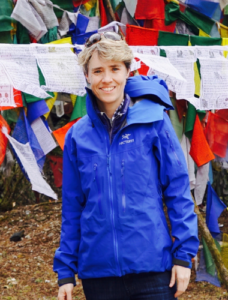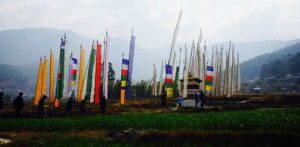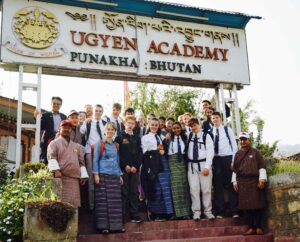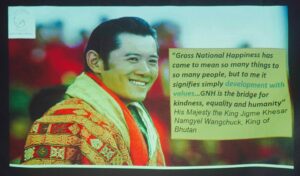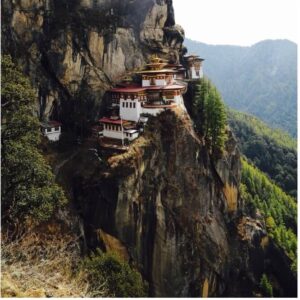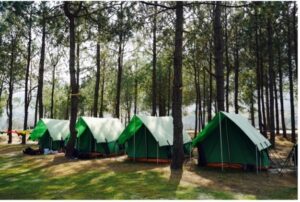The Kingdom of Bhutan - March Break 2023
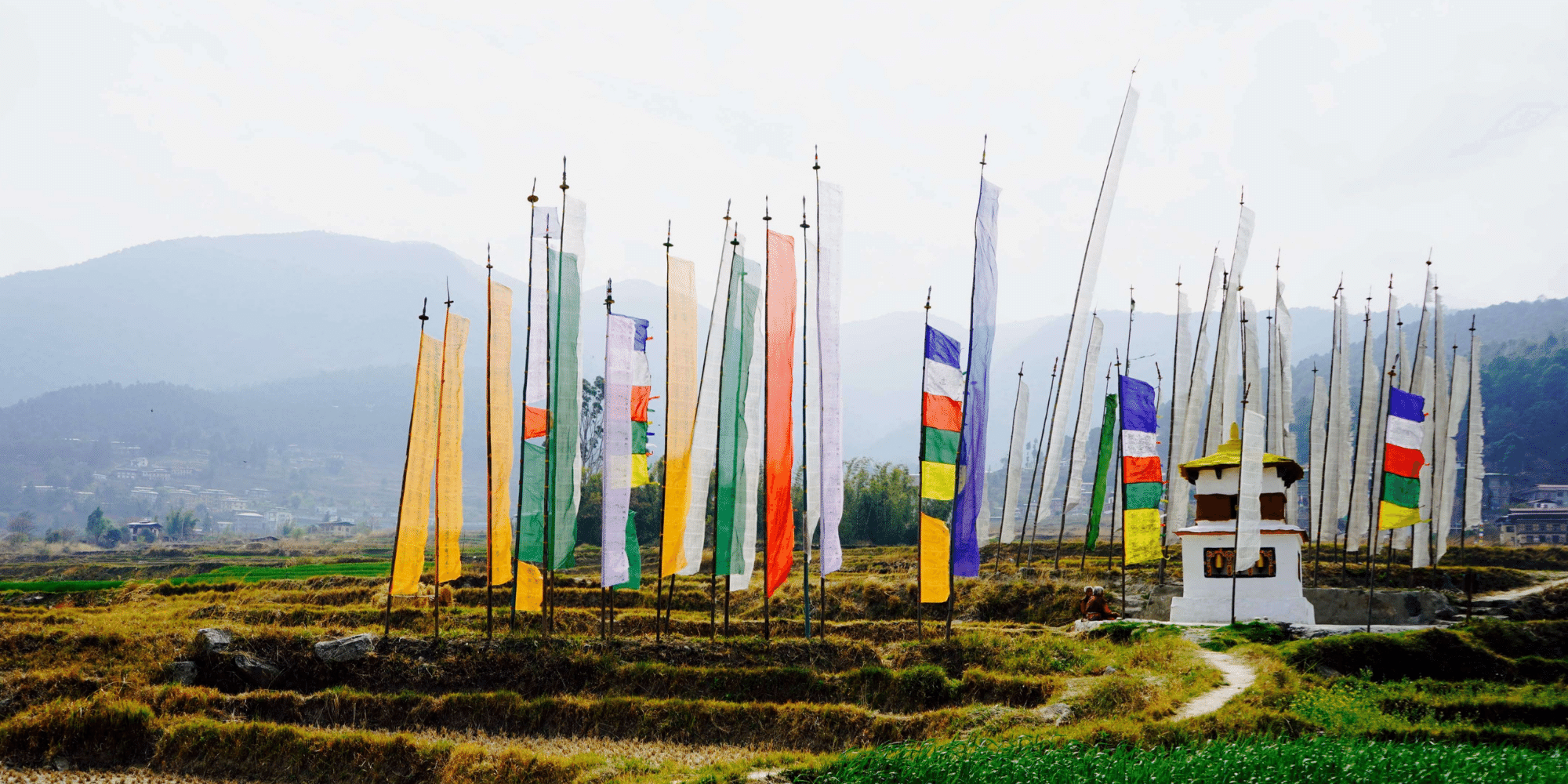
Royal St. George's College & St. Mildred's-Lightbourn School
- 9 Full Days In Bhutan
- Departing Toronto March 10 or 11, 2023
- Departing Bhutan March 22, 2023
- All dates are flight dependent.
Participant commitment and deposit required by middle of October 2022 (final deposit/commitment date will vary by school). Spots are limited. Please express your interest early.
A place unlike anywhere else on Earth
Highlights From Our 2017 Trip
The Kingdom of Bhutan
Explore the Student Experience from our Student Learning Blogs
Reimagining Success
Incredible Kindness @ Ugyen Academy
Opening To A New Way of Living
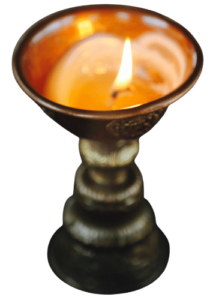
We love bringing students and staff together from different schools
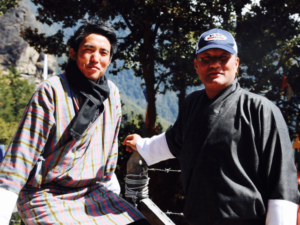
Our Incredible Bhutanese Guides
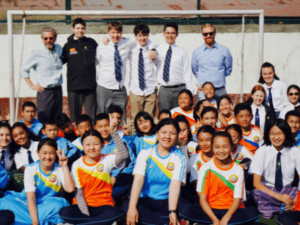
Connection with Local School Partners
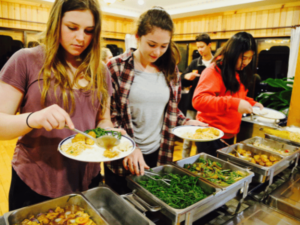
Tasty Local Meals With Lots of Options
The Kingdom of Bhutan Global Learning Itinerary and Details
Key Highlights
Each group will have their own itinerary, however there will be some similarities to their experiences.
- Dochula Pass, a collection of 108 chortens and prayer flags.
- Memorial Chorten – The Memorial Stupa, also known as the Thimphu Chorten, is a stupa, popularly known as “the most visible religious landmark in Bhutan.”
- Centenary Park and Buddha Point, where a massive statue of Shakyamuni measures in at a height of 51.5 meters, making it one of the largest statues of Buddha in the world. We will also visit inside the Buddha, where 125,000 smaller Buddhas reside.
- Punakha Dzong – Punakha Dzong is built on the confluence of the Two rivers Pho chu and Mo chu. It is a magnificent structure and a marvel of traditional Bhutanese architecture. It is considered a pride for Bhutan
- Hike to Taktsang Monastery (Tiger’s Nest), approximately 1000 meters above the Paro valley. The oldest temple founded in 7th century by Tibetan king Songsang Gangpo.
- Learning exchange with students from a local school, overnight, sharing insights with each other about happiness, health, success and personal values.
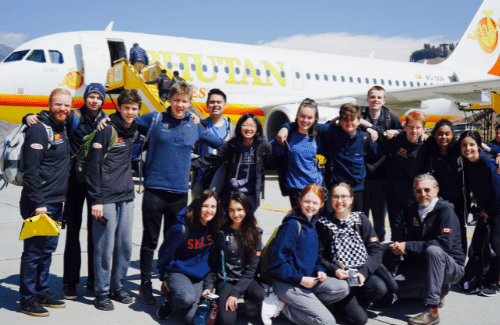
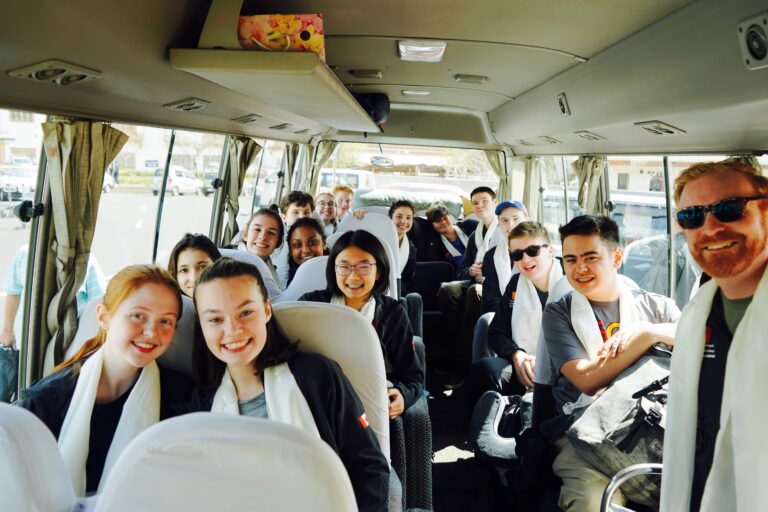
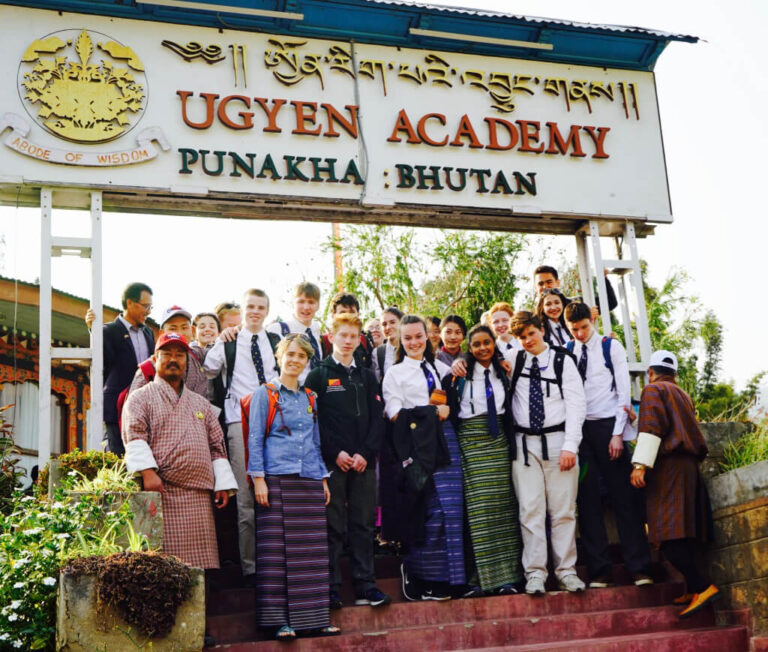
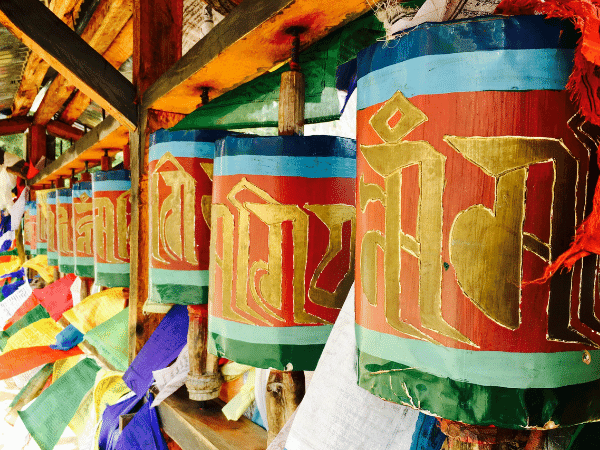
Bhutan Trip Objectives
- To evaluate and examine our own perspectives and our personal values.
- To learn from and share with some of Bhutan’s Secondary School students. Everyone has a different idea of what happiness and success looks like. This will be an opportunity to exchange ideas and examine personal values from very different perspectives.
- To deepen and expand our worldview.
- To be immersed in a society that will contrast the difference in pace and values between a life centered in Western consumerism versus intentional and unhurried living.
- To appreciate Buddhist cultural traditions and spirituality, as well as environmentalism and commitment to conservation.
Interested in Learning More?
Our online registration form to receive trip updates is now closed. We have had an incredible outpouring of interest for the 2023 trip. If you are interested in learning more about future Bhutan trips please send an email to [email protected].
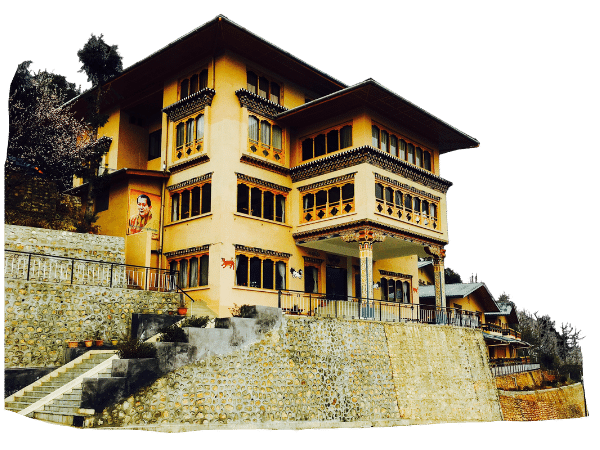
The Finer Details
Our intention is for students from each school to stay together with their chaperone, however, if numbers warrant it, and there is a desire to be mixed with other school’s we are totally open to that, as long as there is a chaperone with each student group. We are limiting each bus group to 18 participants (students and teachers). If one school has 18 students interested, and they wish to have their own bus and their own itinerary that is do-able as well. That will however however negate the possibility of students who are hoping to use this trip as their Duke of Ed. Gold Project, because part of the requirement is for them to be with students they do not know. We imagine that we may end up having smaller groups from a few schools, and they will travel together in one bus.
Our hope is that we have enough people to run two groups with a nice mix of students and staff from various schools. Once deposits are required and paid we will have a much better sense of how many people will be attending. There are 6 different schools who have had students endorsed to enter the Kingdom in March 2023 at the old Sustainable Development Fee. These schools are all CAIS schools: Branksome Hall, Crescent School, Havergal College, Hillfield Strathallan College, Royal St. George’s College and St. Mildred’s-Lightbourn School.
Given the remoteness of this trip, these are the conditions that should be able to be met. Students should be able to comfortably be away from home for an extended period. Families should be aware that we will have limited access to immediate mental health resources and support. Participants should be able to adapt appropriately to unfamiliar living conditions such as eating different food, following different customs, and adjusting to a different time zone. As well they must have the ability to deal with potential conflicts in a small group environment and be flexible as our schedule may shift and change for several reasons, such as weather. From a physical health perspective students should be comfortable hiking at altitude for up to 4 hours at a time. They should also be comfortable moving every day, walking, rafting (floating), camping, etc.
As of September 2022, the price of this trip has been given to each school’s representative. Payment will be happening in a few various stages. Due dates will be set by each invidual school. The fee for our time in Bhutan and the flight into Paro is charged in US currency. Flights from Toronto are in Canadian currency. This portion of the trip will be managed by each individual school, along with individual travel insurance. The total trip price may vary a little by school, based on how many students and staff they have attending. Each school will share pricing with interested families.
* Included in the land cost –daily tariff in Bhutan:
- Sustainable Development Fee (government royalties and taxes)
- Transportation as per itinerary with driver and professional guide
- Meals and accommodation at 3 star hotels. Twin sharing basis
- Community service at schools
- Visa for Entry into Bhutan
- Museum fees and permits for entry into the monasteries
- Undertake shared purposeful activity which provides opportunities for broadening your interests and experience.
- Reside away from your usual place of residence for a total period of no less than five days and four nights.
- Be in the company of others who are, in the majority, not your usual companions.
Transportation
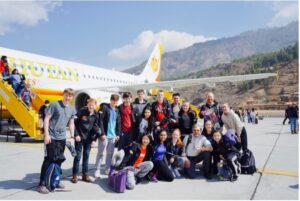
Roads
If you are someone that typically gets motion sickness, you may want to pack some Gravol. It is recommended you bring the non-drowsy ginger Gravol, so you don’t fall asleep and miss the amazing scenery! The Kingdom of Bhutan (considered the single most isolated country in the world) is a hilly and mountainous country that sits in the foothills and lower mountains of the Himalayas. Roads tend to go up and down mountains, along valleys, and through high mountain passes, and are winding and often dangerous, as they rarely have more than one lane. Bhutan is not a place where high speeds can be maintained, hence the maximum speed limit of just 50km/h on roads outside the towns and cities. 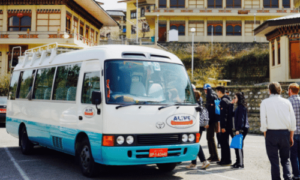
For a country that prides itself on its exclusive tourism industry and protection of the natural environment, there are very few roads in Bhutan. It was not until 1961 that the First Development Plan began, with the 175-kilometer paved road from Phuentsholing to Thimphu, which later had a branch road linking the main road to Paro. With only 8,050 kilometers (5,000 miles) of roads completed in the Kingdom, only around 60 percent are paved with concrete or asphalt.
All rooms are based on double occupancy. If numbers warrant it based on group numbers, a 3rd person may be added to a room. Hotels will be booked once the group is established, and the itinerary is finalized. One night will be spent on a student exchange where our participants will sleep at one of the boarding schools to share an experience with Bhutanese students. The Boarding School Dorm Supervisor will oversee the students for this evening. Chaperones will be in a nearby hotel and reachable by cell phone at all hours. We will spend the day at the school prior to their overnight experience and will meet the Supervisors that day.
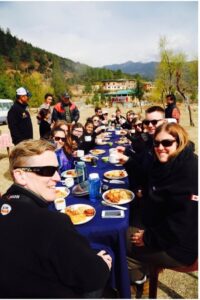
Since most travel in Bhutan is via an all-inclusive package, most of your meals will be in the form of a hotel buffet comprising continental, Indian, Chinese and one or two toned-down Bhutanese dishes.
On long day drives or hikes we will not return to our hotel for lunch. Most of the time there will be a roadside/riverside picnic. This is typically a hot lunch packed inside a series of metal containers packed inside a wide insulated flask.
Please be sure to include all your dietary needs/allergies in detail on your ALIVE Medical form so we can inform Good Karma Travels ahead of time.
Wi-Fi in Bhutan can be spotty and slower than at home, but it’s still quite accessible. There are two GSM (Global System for Mobile) network providers in Bhutan. First is the government owned B-Mobile (Bhutan Telecom) and second is private Tashi Cell. SIM card of both companies can be purchased rather easily. If you plan to buy a SIM card in Bhutan, call your service provider to ensure your phone is UNLOCKED. It’s 4G service.
Most hotels have Wi-Fi in their lobby. Some will have it available in the rooms, and some will not. Of course, staying connected is important. We will be posting photos and student blogs throughout the trip for friends and family to follow along. If you would rather not purchase a SIM card in Bhutan it is also possible to add a phone plan from your provider before leaving Canada. The biggest hurdle to staying in touch is the fact that the time zones are so different.
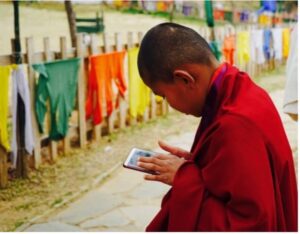
Bhutan is 10 hours ahead of our Eastern Standard Time. Flipping our body’s time clock is not easy. We will work together as group prior to our departure to learn some prevention tips for jet lag and how to set ourselves up for success. A big part of the reason we are returning home approximately 5 days prior to the end of March Break is to allow participants to rest and reground prior to heading back to school.
Bhutan is the world’s last surviving Himalayan Buddhist kingdom and is one of the only countries to place humility and compassion at the centre of its constitution. The three main themes of Buddhism are detachment, ephemerality (the concept of things being transitory, existing only briefly) and change. The pandemic has taught us many lessons and heightened our awareness that the concept of impermanence is constant in all of our lives, regardless of our religion or approach to life. Throughout this journey, there will be ample opportunity to learn from many local people of all ages about their spirituality and culture, and how it plays a significant role in how they live their lives. This in turn will of course allow for many reflective moments both personally and as a group.
Bhutan is among the world’s leading countries in clean energy. At the moment, Bhutan is the only carbon negative country in the world. As mandated in its constitution, Bhutan preserves (at all times) 60 percent of its land under forest cover. According to the decree of the King, cut one tree for whatever purpose, you must plant 3 new trees. Plastic bags are banned. These positive policies help Bhutan have a pristine environment and one of the most diverse ecosystems in the world. Part of the pre-departure work that we will do as a group is to work to find ways that we can work to off-set our inevitable carbon emissions.
To learn more about Bhutan’s commitment to our planet watch this inspiring TED talk. https://www.youtube.com/watch?v=7Lc_dlVrg5
Weather
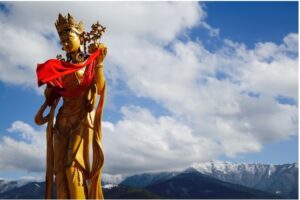
Altitude
When we land in Paro the altitude will be 2200m. Other places you may visit are Thimphu (2334m), Punakha (1242m), Haa Valley (2670m). It’s likely that the highest you will travel on this trip is towards the end of our journey when we do the trek up to Taktsang Monastery (Tiger’s Nest) which sits at approximately 3120m (just over 10,000ft). In the past we have tried to visit Chelela Pass which is at 3988m (13,083ft), but it has always been too covered in snow to visit. We may or may not get there this year.
If you are concerned about altitude sickness, please speak to your travel doctor when you visit. Some of our past participants have brought Diamox with them at the recommendation of their doctor. Most people tend to acclimatize over the course of their first few days, and that is why the hike up to Tiger’s Nest is at the end of our journey.
Airfare (return flight from Bangkok to Paro) is not refundable once the tickets have been purchased. Partial refund may be available for the rest of the cost of the trip, if canceled prior to the arrival date. This amount is dependent on the timing and the bookings. For example, if the cancellation is more than 90 days before our travel date your refund will be higher than if it is 60 or 30 days prior.
Travel to Bhutan is confirmed once the 100% payment is received by Good Karma Travel as per the Tourism Policy of Bhutan, after which your Bhutan Travel Visa is approved by the Royal Government of Bhutan. Refunds do not include the Bhutan Visa Fee. “Date of Travel” refers to Travel dates for Bhutan only.
As of September 23, 2022, there are no more quarantine requirements in Bhutan. If we have learned anything these past few years, it is that things change! Details are yet to be disclosed about how the Kingdom plans to move forward. We will have to revisit this as we inch closer to March 2023. We will keep you posted as things shift and evolve. It is anticipated that all travellers must be vaccinated. We may need to receive a negative PCR test prior to arrival. We will know more prior to our departure.
We are currently planning for 3 of our director team to travel to Bhutan with you. Jalynn Bosley (Owner & Executive Director), Ryan Howard (Director of Risk, Research and Innovation), and Matt Peters (Program Director). For more information, please visit this link:

The Director of ALIVE Outdoors, Sam Dear will be our main point of contact in Toronto for the duration of our trip.
All participants are highly encouraged to visit a travel doctor at least 6 weeks prior to your travels. The main health concerns in Bhutan are like those in other south Asian destinations: there is a potential risk of acquiring traveller’s diarrhea, a respiratory infection due to altitude, etc. As you know, infectious diseases can interrupt your trip and make you feel miserable. Some people may feel the effects from the altitude, but typically after the first few days most people acclimatize. You will need to share your destinations with your travel doctor so they can make the best recommendations possible for you. We will be in Paro, Thimphu, Haa Valley and Punakha.
Rafting

Camping
Tents will be shared by two people. Chaperones will be placed in their own tents in the same tent line as the students.
Ngultrum (Nu) is the locally and officially accepted currency of Bhutan. The currency code is BTN, and the symbol is Nu. 100 cents make up 1 BTN. Cents in Bhutan are called Chhertum.
At the time of writing this document, $1 Canadian = 62.40 BTN (Bhutanese Ngultrum) As we get closer to the trip, this link will let you know the up-to-date exchange rate and will offer you a conversion chart that you can print and bring with you. https://coinmill.com/BTN_CAD.html#CAD=1
When it comes to buying souvenirs, there likely will not be too many things that you want to spend money on. Maybe a few scarves, a piece of art or small prayer wheels/beads. There is not excessive shopping there! Some stores accept VISA. The best bet would be for you to bring USD cash with you. We can get it exchanged for you into BTN once we are there. It is recommended that you bring a $100 bill to exchange rather than smaller bills. For some reason, the exchange rate is better with larger bills. $100-$200 USD should be plenty. (Remember that all your meals, drinks in Bhutan, etc. are covered already). The only time you will need money is when you are traveling to and from Bhutan, when you want to buy a souvenir or for tipping.
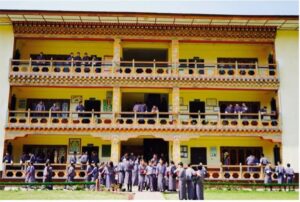
Dorm supervisors will oversee the evening and night in the absence of chaperones. They will have our contact number for any emergency
Initially, please direct your questions to the teacher at your student’s school who is spearheading the organization of this expedition. If they don’t have answers for you, please direct your questions to Jalynn Bosley, Executive Director, ALIVE Outdoors. 